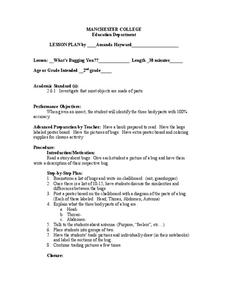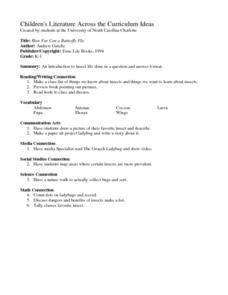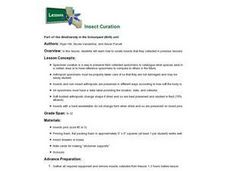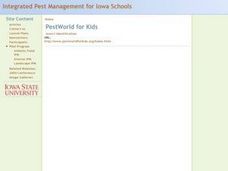Cornell University
Insect IPM
Find out the characteristics that makes a bug an insect with a workbook designed to inform scholars about the crawly creatures that live around us. Scholars complete an ant-themed word search, answer questions using a solution key,...
Cornell University
Insect Anatomy
Young entomologists discover insect anatomy in a very detailed unit plan. Offering background information for teachers about various insects, class members explore the differences between bugs and insects—and yes, there are many...
Science Friday
Ugh, a Bug!
Young entomologists familiarize themselves with the physical characteristics of insects. Composed of two activities, each lesson involves your scientists tapping into their prior knowledge of bugs and making observations of real live...
Curated OER
Bug Snack
Students create an insect out of food. In this insect characteristics lesson, students review the 3 body parts of an insect and use various foods to create a sample insect. Students learn a song about insect body parts.
Curated OER
What's Bugging You?
Second graders investigate insects. In this parts of a whole, 2nd graders discuss what the three body parts of an insect are as well as the antenna. Students create their own insect labeling each body part and antenna.
Curated OER
Buzzing Bee's Wardrobe
Students investigate the anatomy of honeybees. In this anatomy lesson, students research the physical characteristics of bees and discover what they do. Students create a model of a honeybee showing the correct anatomy.
Curated OER
Insect Anatomy
In this insect worksheet, students label the parts of an insect on a diagram and then write down one fact about each of the body parts. This worksheet has 5 fill in the blank and 6 short answer questions.
Curated OER
Inventing Insects
Students explore the world of insects and discover what it might be like to live like one. They create an insect with physical characteristics and demonstrate how it moves. Students also compare and contrast insects to spiders and how...
Curated OER
How Far Can a Butterfly Fly
Students draw a picture of their favorite insect and describe. Students make a paper art project ladybug and write a story about it. Students map areas where certain insects are more prevalent. Students count dots on ladybugs and record.
Curated OER
"The Aquatic Fish Foods"
In this insects worksheet, students access a website to answer questions about the different types of insects that are food for fish. This worksheet has 10 short answer questions.
Curated OER
Introduction to Pinning Insects
Students are introduced to how to properly pin insects by reviewing insect morphology, insect orders and recognizing that the second and third thoracic segments contain large locomotor muscles that bind to the pin.
Curated OER
Insect Curation
Learners explore how to curate insects that they collected in previous lessons. They are told that specimen curation is a way to preserve field collected specimens to catalogue what species exist in a certain area or to have reference...
Curated OER
World of Insects
In this biology worksheet, students identify and locate various vocabulary terms related to the world of insects in the puzzle. There are 51 words to locate in the word search.
Curated OER
Insects
Students, through books, videos, and readings, explore characteristics of insects. In groups, they choose an insect to research. Students discover their insect's diet, how they move, and where they live. Afterwards, they use the facts...
Curated OER
Environment: Mealworm Observations
Young scholars observe plant and animal growth and participate in class discussions about the subjects. They also record their observations in a log. Using observation and the scientific method, they describe the characteristics of...
Curated OER
Termite Biology
Students explore the physical characteristics, distribution and habitat of termites. The lesson focuses on the termite as a social creature contrary to most other insects.

















